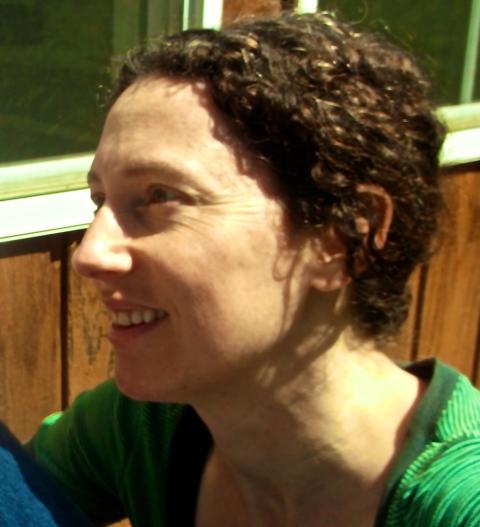Interview with Miranda Mellis
Hometown: San Francisco, CA
Current town: Olympia, WA
What are you working on now?
I am completing a novella called Escaping, a novel which explores entrapments of language and meditates on an impossible desire that is ignited by such entrapments: the desire to escape relation. The characters are teachers, artists, administrators, youth, family members, poets, and finally a hermit. I’m playing around with hearing language “out of place” in this book, as a way of witnessing and becoming more awake to the primacy of unspoken rules, habitual “language games” at work in every discursive setting, in every relationship. The arc of the book finds the four main characters “escaping” in one way or another by the end. I’m also writing essays and talks, and composing curriculum for teaching. This week I have been writing up the results of a day-long workshop on interdisciplinary collaboration at Evergreen State College, where we nearly always teach on teams comprised of people from different fields.
Care to share a moment, a person or a story from your past that made you want to become a writer?
Like many writers, I was a bookworm as a child, often preferring to read, over playing outside. I loved reading so much that I didn’t think there was anyone more interesting or powerful than an author. I had the feeling that to be a writer was to be a kind of deity. Turns out it is the opposite of that! :) I read Dostoyevsky with particular fervor as a teenager. I was fully absorbed and awed by “the classics” with their elaborate plots and complexly layered sentences.
If you could change one thing about publishing what would it be?
I have a friend who is so well supported as an artist in France, that the government even paid for his family to have a vacation because it’s healthy for them! It sounds improbable, but it’s still the case that there are states that support artists. If there was one thing I would change about publishing it would be that there was robust governmental support at federal and state levels for artist infrastructures, including publishing, and stipends for artists so that one could live and work full time as an artist, instead of having to hold multiple jobs while trying to foster your work. One has to sort of escape into it, or escape out of it, find a way against all odds. In Principle of Unrest Brian Massumi shares a concept he calls “surplus value of life.” In contradistinction to “surplus value” surplus value of life is qualitative. This concept is a way to value, or revalue, that which cannot be monetized. He writes that “Anywhere a non-monetized surplus-value of life is generated there has occurred what I term . . . an escape to the immanent limit. Escapes can be deviations, perversions, hijacking, hackings. They come in many varieties.” It’s strange that we have to use the language of economics to practice valuing what doesn’t count in capitalism. For example, in ecology the vocabulary of economics is often used to put a value on that which is priceless, in the hopes that by naming these entities in the language of economics, at last their “value” will register, be recognized, so we have terms like “natural capital” which cut apart what are continua, innumerable entanglements and symbioses that characterize this biosphere, reduced to prices.
What kind of writing excites you?
I am excited by writing that functions at once as art and philosophy, and that works carefully and in an unexpected way at the level of the sentence. I am excited by writing that jokes compassionately and writing that I am on the very edge of understanding, that oscillates in and out of clarity, and that can’t be exhausted in a single reading or even multiple readings, and that takes formal chances. I like writing that is in conversation with many different kinds of worlds, texts, arts, experiences, and approaches to the page. But of course, one doesn’t always read to be excited. Sometimes one reads to be informed, or to be bored, and that’s also very necessary.
What advice do you have for writers just starting out?
Once I had the good fortune to be in a “master class” with Grace Paley. I’ll pass on this great piece of advice she gave: if you’re having trouble writing well, write badly on purpose. Take workshops so you can be in conversations about writing, so you can hone your criticality and broaden your sense of what’s possible, so you can make friends to compete with and admire. Workshops are good, despite rumors to the contrary. It’s a shop where you can get accustomed to the fact that writing is work: the workshop. You don’t have to do too many of them but at least do a few. It’s where you will start to get a feel for the tools of the trade. It’s salutary to be in spaces where things are unfinished and in process, open and on trial. Publish other people, write about their work, foster what you care about, cultivate worlds for writing, don’t be cowed by received spaces, be they the long-running reading series in your town or the industrial trade fair. You too can start a series, publish a journal, or organize a conference. If you take responsibility for the editorial and curatorial process, publishing will be demystified. Your life as a writer will not be quite so confusing because you’ll understand better the various parts of the process. Check out collective and community arts based editorial projects such as Encyclopedia Project Vol.3, L-Z which (full disclosure) I coedited.

